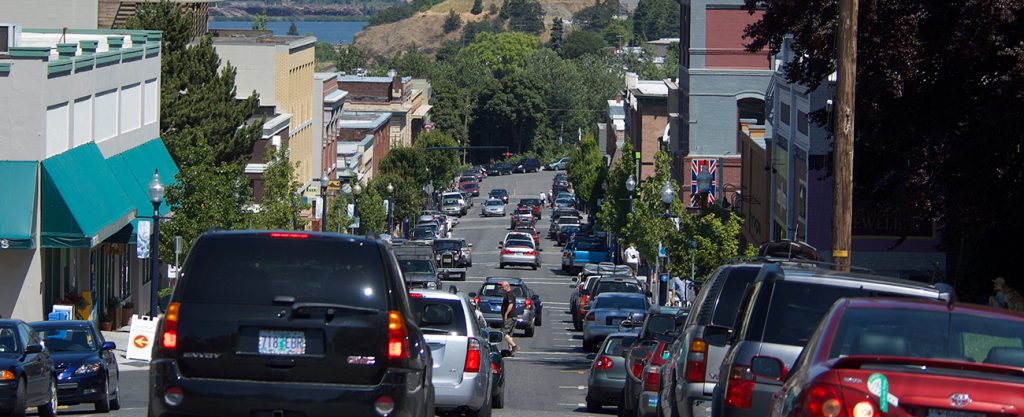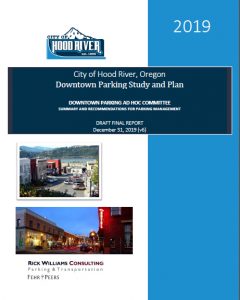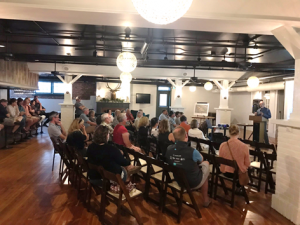
Downtown Parking Study concludes
 Downtown Hood River is an active commercial district experiencing pressure on its parking supply. In 2019, the City of Hood River sought specialized assistance from Rick Williams Consulting (RWC) and Fehr & Peers to examine parking management solutions for on- and off-street systems in the area. The work included the analysis of background conditions, development of guiding principles of the parking strategy, plus current and forecasted parking demand. The year-long study concluded recently, with a comprehensive strategy to enhance the functionality and operation of the downtown parking system. Effective parking management increases supply, which supports housing and mixed-use development to keep our downtown vibrant and active. The phased parking system projects address congestion in the immediate, short-term, mid-term and long-term.
Downtown Hood River is an active commercial district experiencing pressure on its parking supply. In 2019, the City of Hood River sought specialized assistance from Rick Williams Consulting (RWC) and Fehr & Peers to examine parking management solutions for on- and off-street systems in the area. The work included the analysis of background conditions, development of guiding principles of the parking strategy, plus current and forecasted parking demand. The year-long study concluded recently, with a comprehensive strategy to enhance the functionality and operation of the downtown parking system. Effective parking management increases supply, which supports housing and mixed-use development to keep our downtown vibrant and active. The phased parking system projects address congestion in the immediate, short-term, mid-term and long-term.
Key findings and recommendations
Serving a sounding board to the consulting team, a community parking committee (including downtown business and building owners, two council members, a planning commission liaison, representatives from Hood River Farmer’s Market, Columbia Area Transit (CAT) and City staff members) made the following findings and recommendations to the City Council:
- The City will need to lead the effort to initiate these solutions, in partnerships with private partners and the broader community.
- Implementation of the recommendations should be a priority for downtown.
- New growth cannot be met within existing supply/capacity.
- “Capacity” can be parking, alternative modes (i.e. transit bike, walk), or a combination of both.
- Cost of new supply/capacity must be shared fairly among all who benefit from the parking system. This includes the City, new and existing developments, and users (businesses, employees, and customers).
- The outcome of carrying out the plan will be a more vibrant downtown, supporting existing businesses and commercial, residential/housing growth.
A guide to implementation
The Downtown Parking Study outlines 31 recommended strategies intended to enhance the system to support downtown. Each strategy detailed in the study follows a logical order of phased implementation, from Immediate (0 – 12 months), Short (12 – 24 months), Mid (24 – 36 months), and Long-Term (36+ months), with estimated costs where applicable. A number of near-term approaches shall be employed as soon as possible to serve as a foundation for decision-making and future policy development.
- Adopting the Guiding Principles established for the Plan and embracing the 85% Occupancy Rule as the standard for upcoming decision-making.
- Resolving the City’s role in parking, future funding sources for new parking and/or adding new capacity and revising the City’s development code to reflect this role.
- Initiating revisions recommended for the existing supply to create new efficiencies and improve customer convenience. This will allow adequate time for the City to better address how future demand will be accommodated.
Overall, the implementation schedule is flexible, and the order of projects may be changed as opportunities and resources are identified. The biggest, and in some cases most ambitious or complicated strategies include fee-in-lieu reconfiguration, identifying supply adjacent or remote from the downtown area, funding and developing new supply. Finally, the information and recommendations in the final report are intended to complement broader transportation and economic development efforts.
Parking study development
Strategies recommended in the Downtown Parking Study and Plan were developed with the assistance of the community parking steering committee. In 10 work sessions, two community meetings and various public outreach surveys, the committee evaluated opportunities and constraints within the parking system and outlined ways to improve the efficiency and function of the existing supply as well as set a base for addressing future commercial and housing growth.

This process was informed with data collected in the winter and summer of 2018. Broad research was provided on topics to help the public and parking committee better understand the strategy development process. White Papers, shared with the public and published on the city’s website, evaluated issues, used available data, incorporated research from industry best practices and, in sessions with the committee, tailored outcomes to Hood River’s unique parking and access environment. More information and full copies of each White Paper can be found on the Parking Study pages at cityofhoodriver.gov or can by placing a request with the Planning Department.
Please consider signing up HERE to receive quarterly Emails of future editions of Hood River City Connect.
Si le gusta lo que acaba de leer, considere inscribirse AQUI para recibir correos electrónicos trimestrales de futuras ediciones de Hood River City Connect.
